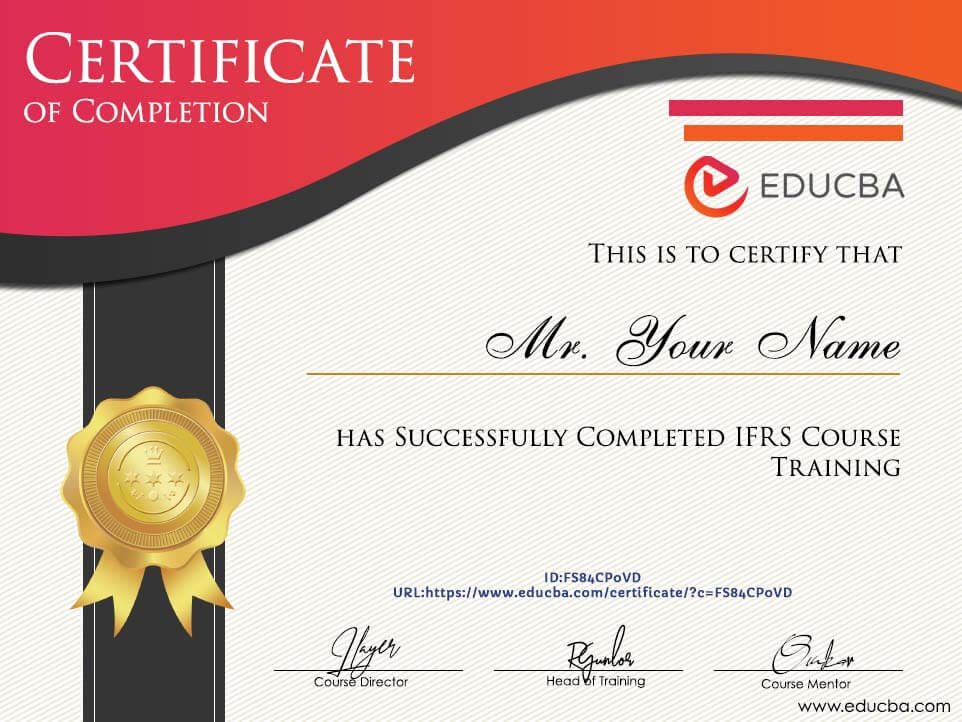
IFRS
Specialization | 30 Course Series | 5 Mock Tests
This IFRS Training Certification is an awesome bundle of 30 courses with 42+ hours of video tutorials and One year access. Along with this, you also get verifiable certificates (unique certification number and your unique URL) when you complete these courses. Through this course we understand and learn the application of accounting standards issued by the IASB.
Offer ends in:
What you'll get
- 42+ Hours
- 30 Courses
- Mock Tests
- Course Completion Certificates
- One year access
- Self-paced Courses
- Technical Support
- Mobile App Access
- Case Studies
Synopsis
- Courses: You get access to all 30 courses, Projects bundle.
- Hours: 42+ Video Hours
- Excel Templates Included? Excel templates that were used are provided as a download
- Course Validity: One year access
- Eligibility: No eligibility as such. You should have a keen interest in learning.
- Pre-Requisites: None (Basic accounting knowledge should help)
- What do you get? Certificate of Excellence for each of the 30 courses, Projects
- Certification Type: Course Completion Certificates
- Verifiable Certificates? Yes, you get verifiable certificates for each course with a unique link. These link can be included in your resume/Linkedin profile to showcase your enhanced skills.
- Type of Training: Video Course – Self Paced Learning
Content
-
MODULE 1: IFRS Core Standards
Courses No. of Hours Certificates Details IFRS Overview 1m ✔ IFRS 1 - First-Time Adoption 53m ✔ IFRS 2 (2024): Share-based Payment 33m ✔ IFRS 3 Business Combinations 45m ✔ IFRS 4 (2024): Insurance Contracts 40m ✔ IFRS 5 Non Current Assets and Discontinued Operations 46m ✔ IFRS 6 Evaluation of Mineral Resources 35m ✔ -
MODULE 2: IFRS Essentials
Courses No. of Hours Certificates Details IFRS 7 (2024): FI-Disclosures 29m ✔ IFRS 8 - Operating Segments Insights 44m ✔ IFRS 9 - Financial Instruments 2h 22m ✔ IFRS 10 - Consolidated Financial Statements 2h 13m ✔ -
MODULE 3: Advanced Financial Reporting with IFRS
Courses No. of Hours Certificates Details IFRS 11 (2024) Joint Arrangements 35m ✔ IFRS 12 Disclosure of Interests in Other Entities 37m ✔ IFRS 13 (2024) Value Measurement 1h 13m ✔ IFRS 14 (2024) Regulatory Deferral Accounts 19m ✔ IFRS 15 - Revenue from Contracts with Customers 2h 29m ✔ IFRS 16 - Leases 2h 28m ✔ Consolidated Financial Statements ( Before & Post IFRS) 3h 33m ✔ -
MODULE 4: Additional Readings
Courses No. of Hours Certificates Details IFRS 1 - First-time Adoption of International Financial Reporting Standards 1h 32m ✔ IFRS 2 - Share-based Payment 2h 39m ✔ IFRS 3 - Business Combinations 2h 36m ✔ IFRS 4 - Insurance Contracts 57m ✔ IFRS 5 - Non-current Assets Held for Sale and Discontinued Operations 2h 03m ✔ IFRS 6 - Exploration for and Evaluation of Mineral Resources 1h 21m ✔ IFRS 7 - Financial Instruments: Disclosures 1h 43m ✔ IFRS 8 - Operating Segments 2h 17m ✔ IFRS 11 - Joint Arrangements 1h 24m ✔ IFRS 12 - Disclosure of Interests in Other Entities 1h 04m ✔ IFRS 13 - Fair Value Measurement 2h 5m ✔ IFRS 14 - Regulatory Deferral Accounts 1h 19m ✔ -
MODULE 5: Mock Tests & Quizzes
Courses No. of Hours Certificates Details Test - IFRS Assessment Test Test - Mock Exam IFRS Test - IFRS Complete Exam Test - IFRS Ultimate Exam Test - IFRS Mock Exam
Description
Welcome to our comprehensive course on International Financial Reporting Standards (IFRS)! In this course, we will delve deep into the intricacies of IFRS, providing you with a thorough understanding of its principles, standards, and applications in the global financial landscape.
IFRS has become the benchmark for financial reporting in many countries around the world, fostering transparency, comparability, and reliability in financial statements across diverse industries and markets. As such, proficiency in IFRS is essential for finance professionals, accountants, auditors, and anyone involved in financial reporting.
Throughout this course, you will embark on a structured journey through various sections, each dedicated to key IFRS standards and topics. From the fundamental concepts of IFRS adoption to complex areas such as share-based payments, business combinations, and fair value measurement, we will cover a wide spectrum of topics to equip you with the knowledge and skills necessary to navigate the complexities of international financial reporting.
Whether you're a seasoned finance professional looking to enhance your expertise or a student aspiring to build a solid foundation in financial reporting standards, this course is designed to meet your learning needs. Through a combination of theoretical explanations, practical examples, and Excel demonstrations, we aim to provide you with a comprehensive learning experience that will empower you to apply IFRS principles with confidence in real-world scenarios.
Join us on this educational journey as we unravel the nuances of IFRS and unlock the doors to a deeper understanding of international financial reporting standards. Let's embark on this enriching learning adventure together!
Section 1: IFRS 1: Time Adoption of IFRS
In this section, students will gain an understanding of the initial adoption of International Financial Reporting Standards (IFRS) and its implications. The lectures cover the introduction to the course, categories, and conceptual framework of IFRS. They delve into the objectives of IFRS 1, exemptions, reporting, and disclosure requirements, providing Excel examples to reinforce learning.
Section 2: IFRS 2: Share-Based Payment
This section focuses on share-based payment transactions, including valuation techniques, equity, and cash-settled transactions. Students will learn about the disclosure requirements associated with share-based payments, with practical Excel examples to illustrate concepts.
Section 3: IFRS 3: Business Combinations
Here, students will explore the accounting treatment for business combinations under IFRS 3. Lectures cover objectives, definitions, recognition, and measurement of business combinations, along with examples to reinforce understanding. The section also addresses non-controlling interests, goodwill, and disclosure requirements.
Section 4: IFRS 4: Insurance Contracts
In this section, students will learn about the accounting for insurance contracts according to IFRS 4. Topics include the initial recognition and measurement of insurance contracts, subsequent measurement, modifications, and disclosures. Excel examples are provided to demonstrate calculations and concepts.
Section 5: IFRS 5: Non-Current Assets and Discontinued Operations
This section covers the accounting treatment for non-current assets held for sale and discontinued operations under IFRS 5. Students will learn about classification criteria, measurement, and disclosure requirements through lectures and Excel presentations.
Section 6: IFRS 6: Exploration for and Evaluation of Mineral Resources
Students will gain insights into the accounting for exploration and evaluation of mineral resources under IFRS 6. The lectures cover definitions, impairment testing, presentation, and disclosures related to mineral resources, supplemented with Excel examples for depreciation and revaluation.
Section 7: IFRS 7: Financial Instruments - Disclosures
In this section, students will learn about the disclosure requirements for financial instruments under IFRS 7. Topics include objectives, qualitative and quantitative disclosures, and examples of financial instrument disclosures, supported by Excel illustrations.
Section 8: IFRS 8: Operating Segments
This section focuses on operating segment reporting according to IFRS 8. Students will explore the scope, identification, and reporting of operating segments, along with reconciliation and entity-wide disclosures. Excel examples are provided to enhance understanding.
Section 9: IFRS 10: Consolidated Financial Statements
Here, students will delve into the principles of consolidated financial statements under IFRS 10. Lectures cover the consolidation model, exceptions, and examples of consolidated financial statements, facilitating comprehension.
Section 10: IFRS 11: Joint Arrangements
Students will learn about joint arrangements and their accounting treatment under IFRS 11. Lectures cover joint control assessment, types of joint arrangements, financial statement presentation, and Excel examples to reinforce learning.
Section 11: IFRS 12: Disclosure of Interests in Other Entities
This section addresses the disclosure requirements for interests in other entities under IFRS 12. Students will learn about disclosures related to subsidiaries, joint arrangements, and unconsolidated structured entities, supported by Excel examples.
Section 12: IFRS 13: Fair Value Measurement
In this section, students will gain an understanding of fair value measurement principles according to IFRS 13. Lectures cover concepts, valuation techniques, initial recognition, and disclosures, with Excel examples to illustrate calculations and concepts.
Section 13: IFRS 14: Regulatory Deferral Accounts
The final section explores regulatory deferral accounts and their accounting treatment under IFRS 14. Students will learn about the overview, accounting, presentation, and disclosures related to regulatory deferral accounts, supplemented with Excel examples for better comprehension.
Sample Certificate

Requirements
- Basic Accounting Knowledge: Familiarity with fundamental accounting principles and concepts is essential to grasp the advanced topics covered in the course.
- Financial Reporting Understanding: A solid understanding of financial reporting standards and practices will facilitate comprehension of IFRS principles and requirements.
- Proficiency in Excel: Basic proficiency in Microsoft Excel is recommended, as some lectures include Excel examples and illustrations to reinforce concepts.
- Financial Analysis Skills: Basic skills in financial analysis will aid in interpreting financial statements and understanding the implications of adopting IFRS.
- Previous Course Completion: Completion of an introductory accounting or financial reporting course can provide a foundation for more advanced topics covered in this course.
Target Audience
- Accounting Professionals: Certified public accountants (CPAs), auditors, financial analysts, and other accounting professionals seeking to enhance their knowledge of International Financial Reporting Standards (IFRS) and stay updated with regulatory changes.
- Finance Managers: Finance managers, controllers, and CFOs responsible for financial reporting and compliance within their organizations.
- Students Pursuing Accounting Degrees: Undergraduate and graduate students studying accounting or finance who want to deepen their understanding of IFRS principles and applications.
- Corporate Training Programs: Companies providing professional development and continuing education opportunities for their finance and accounting teams to ensure compliance with IFRS.
- Consultants and Advisors: Financial consultants, advisors, and educators looking to expand their expertise in IFRS to better serve their clients or students.
Course Ratings
Offer ends in:
Training 5 or more people?
Get your team access to 5,000+ top courses, learning paths, mock tests anytime, anywhere.
Drop an email at: [email protected]

Good course. It is presented in a very simple and understandable way. the bonus added to this course are the examples that are given at the end. so in case you have missed something or something is not yet clear during the course, you will definitely understand it with the examples. off course you always have the option to go back and listen again.
Daryll Medar
The course is provided in great detail and hence provides extensive knowledge. The material is nicely explained with examples on MS Excel. It is clear and simple to understand. Right from the basics it explains and hence clears the fundamentals. Doubts got cleared providing understanding of the topic.
Suruchi Batra
Training objectives were clearly explained and achieved. The course was very relevant to my job and will help me in most aspects of my work. The trainer used a lot of clear and easy to understand examples and explained the matter in very simple language. I recommend to anyone involved in deferred income analysis and reporting.
Justyna Dziennik